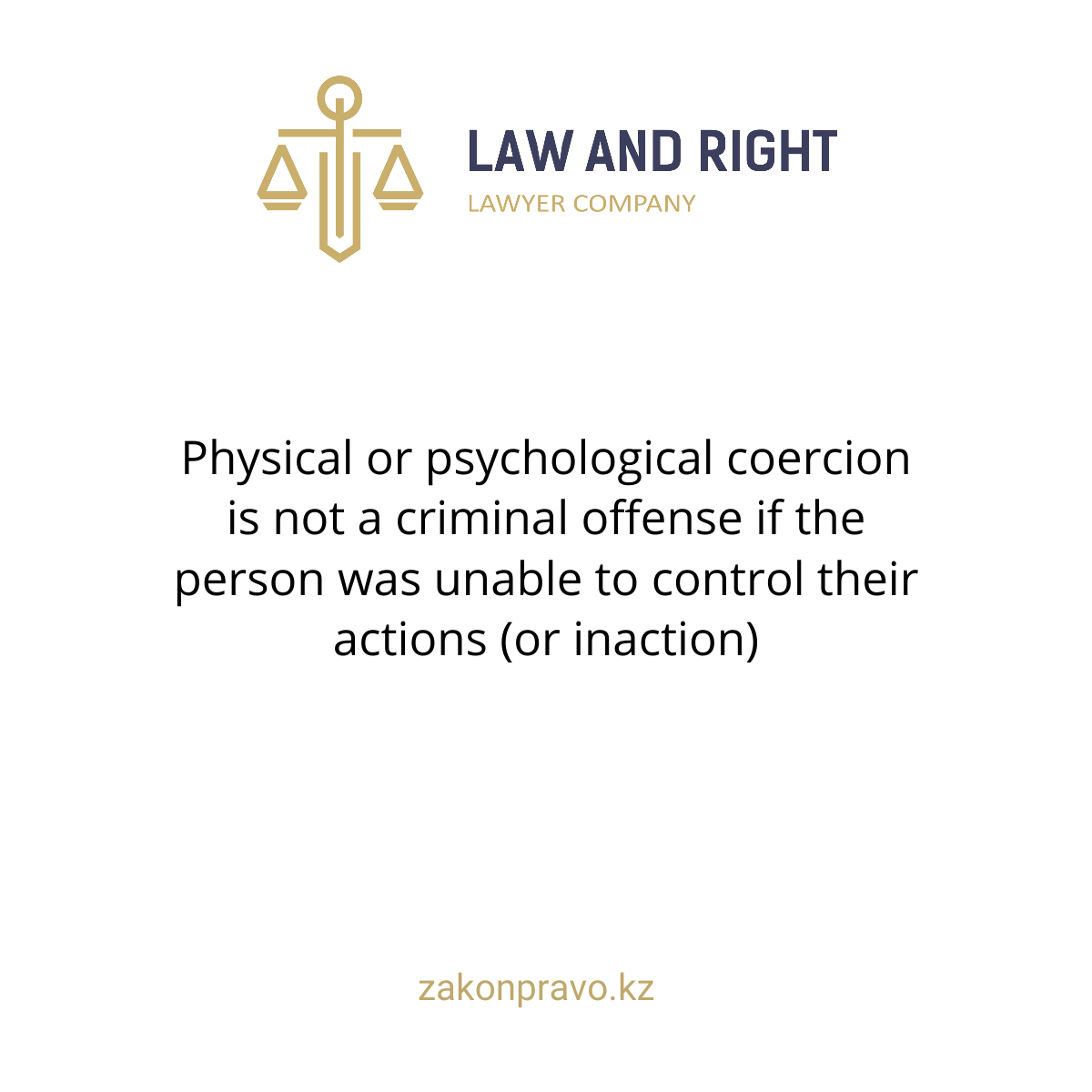Physical or psychological coercion is not a criminal offense if the person was unable to control their actions (or inaction)
Article 37 of the Criminal Code of the Republic of Kazakhstan (CC RK) regulates the grounds for exemption from criminal liability in cases where a person acts under the influence of physical or psychological coercion. Below is a detailed legal commentary, including analysis, examples from practice, and references to related articles of other codes and regulatory acts.
📘 General Provisions
Article 37 of the CC RK provides:
- Causing harm to interests protected by law as a result of physical or psychological coercion is not a criminal offense if, due to such coercion, the person was unable to control their actions (or inaction).
- In cases where harm is caused under physical or psychological coercion, and the person retained the ability to control their actions, the issue of criminal liability is resolved in accordance with Article 34 of the CC RK (Extreme Necessity).
⚖️ Conditions for Exemption from Criminal Liability
Physical or Psychological Coercion
· Physical coercion: Direct bodily impact restricting a person's freedom of action (e.g., binding, restraining, use of force).
· Psychological coercion: Influence on a person’s mental state causing fear or distress (e.g., threats of violence, blackmail).
- Inability to Control Actions
A person is not subject to criminal liability if, as a result of coercion, they were unable to understand the nature of their actions or had no real alternative.
🔄 Cases Requiring Additional Assessment
If the coerced person retained the ability to control their actions, their conduct is assessed based on Article 34 of the CC RK (Extreme Necessity). In such cases, it is necessary to determine:
· Whether there was a real threat that could not be avoided by other means.
· Whether the harm caused was proportionate to the danger averted.
🧾 Judicial Practice
In the judicial practice of the Republic of Kazakhstan, cases involving physical or psychological coercion are reviewed based on the specific circumstances of the case. Courts assess:
· The nature and degree of coercion.
· The individual's capacity to understand and control their actions.
· The availability of alternative ways to avoid causing harm.
📚 Related Regulatory Acts
· Article 34 of the CC RK: Extreme Necessity.
· Article 23 of the CC RK: Innocent Causing of Harm.
· Article 7 of the Criminal Procedure Code of the Republic of Kazakhstan: Explanation of Certain Terms Used in This Code.
· Normative Resolution of the Supreme Court of the Republic of Kazakhstan dated October 28, 2005 No. 6: On Judicial Practice in Cases of Military Criminal Offenses.
🧠 Conclusion
Article 37 of the CC RK provides legal grounds for exemption from criminal liability in cases where a person acts under the influence of irresistible physical or psychological coercion. However, in situations where the individual retains the ability to control their behavior, their actions are assessed under the doctrine of extreme necessity. When considering such cases, courts thoroughly analyze all circumstances to determine whether the conditions for exemption from liability are met.
Attention!
Law and Law Law Law draws your attention to the fact that this document is basic and does not always meet the requirements of a particular situation. Our lawyers are ready to assist you in legal advice, drawing up any legal document suitable for your situation.
For more information, please contact a Lawyer / Attorney by phone: +7 (708) 971-78-58; +7 (700) 978 5755, +7 (700) 978 5085.
Attorney at Law Almaty Lawyer Legal Services Legal Advice Civil Criminal Administrative Cases Disputes Protection Arbitration Law Firm Kazakhstan Law Office Court Cases


